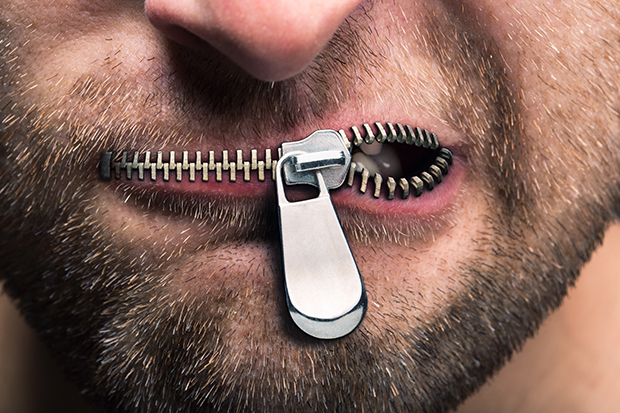
(Photo illustration: Shutterstock)
It’s hard not to feel sorry for Abu Haleema. The poor man can’t catch a break. All he wants to do is establish a global caliphate under the harshest possible interpretation of sharia — a caliphate in which, he hopes, he will play a significant role — and yet he is thwarted at every turn.
First the authorities stop him from travelling to Syria to join the Islamic State. And then, to add insult to injury, they take away his internet, like he’s a naughty teenager. It’s a hard knock life for Abu.
And it’s about to get even harder. In the Queen’s Speech, the government announced a new counter-extremism bill which, will essentially make the existences of Abu Haleema and people like him illegal, without actually making them illegal.
How does that work? To quote the BBC: “The legislation will also propose the introduction of banning orders for extremist organisations who use hate speech in public places, but whose activities fall short of proscription.”
This, in essence, is a thought ASBO, a convenient way of stamping out “extremism” without making any serious attempt to test that behaviour against any kind of proper harm principle.
Whether we like it or not, we do have laws on hate speech and incitement to violence in the United Kingdom. We also have the powers to proscribe terrorist organisations.
But these powers are apparently not enough: and so we must create semi-legal sub-strata of behaviour where people can be censored on the basis of us not liking what they say very much.
This is not some plea for accommodation of the views of Abu Haleema and his friends. Let us be very clear here: these are views which are entirely antithetical to the secular liberal democracy we aspire to be.
But that fact is exactly the test of a secular liberal democracy: if we are to imagine free speech as a defining value of democracy (as David Cameron has said he does) then we cannot just choose which free speech we will defend and which we will not (as David Cameron has said he wants to). As commentator Jamie Bartlett has pointed out, free speech is not something that one pledges allegiance to in the abstract while stifling in the practice.
Predictably, we now turn to the life and times of George Orwell for a lesson from history.
In early 1945, a small group of London anarchists found themselves facing prosecution for undermining the war effort — specifically the charge of “causing disaffection among the troops”. Their crime was to criticise basic training, and to suggest that Belgian resistance movements should not hand over weapons to their Allied liberators, but instead retain their arms and set about building workers’ militias which would form a revolutionary force in post-Nazi Europe.
For this, several of the group were jailed, the British authorities of the time not noticing the irony of fighting for freedom in Europe while jailing dissidents at home.
The failure of the state — and the civil liberties movement — to stand for the right to free speech led to the formation of the Freedom Defence Committee.
Most of the supporters of the Freedom Defence Committee, including Orwell, would have had some sympathy with the anarchist position (Orwell had hoped, in the early days of the war, that the training and arming of the Home Guard would lead to a socialist revolution after the Nazis had been defeated. Apart from that, at least one of the accused, Vernon Richards, was a friend of Orwell’s).
But Orwell and his comrades in the Freedom Defence Committee were alert to the fact that one cannot simply defend the freedom of one’s friends. One also had to stand for the rights of communists and even fascists to hold their views. (Before any reader attempts to refer me to Orwell’s supposedly infamous “list” of communists and fellow travellers, supplied to his friend Celia Kirwan at the government’s Information Research Department, let me point out that it was a list compiled as a favour for a friend, not a blacklist: no one on that list was ever arrested, and they pursued their careers and lives unhindered). This led to the FDC taking the position that those with unpopular views – even those who had been (and still were) on the other side in the war, should be given the same justice as everyone else – demanding, for example, proper rights in cases of dismissal from employment when such a concept barely existed for anyone.
Fascists, communists and Islamists aside, there is probably not a single political grouping in Britain today that does not lay some claim to Orwell’s legacy. But as with free speech arguments, all tend to support the side that supports their side: libertarians cling to the anti-surveillance overtones in his work, while ignoring the long-held demands for state intervention on some issues. Conservatives admire the anti-communism, while ignoring the horror at capitalism, tradition, and the class system. Socialists pretend that Nineteen Eighty-Four and Animal Farm were anything else apart from scathing attacks on left utopianism.
Orwell was a far from perfect figure, but he did get a lot of things right — the fundamental one being the consistent application of principles on issues of liberty.
It is fashionable to invoke Big Brother whenever governments introduce new surveillance measures, or suggest censorship of extremist views. It is also, generally, silly and hyperbolic. But when faced with an enemy entirely at odds with democracy, as we are with Islamist extremism, it’s worth noting that, as did Orwell and his comrades, it is possible to attack the ideology while standing firm on freedom.
An earlier version of this article stated that a group of London anarchists faced prosecution for suggesting the Belgian resistance movements should not hand over weapons to their German liberators. This has been corrected.
This column was posted on 28 May 2015 at indexoncensorship.org




